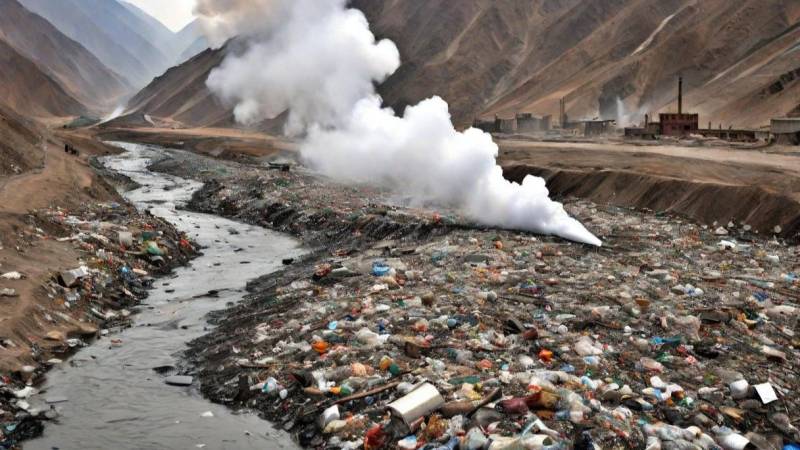
Picture a world where the air we breathe is clean, the water we drink is pure, and the environment thrives in harmony with all living beings. Unfortunately, our reality paints a starkly different picture. Pollution, the insidious foe of our planet, seeps into every corner of our world, wreaking havoc on ecosystems, endangering lives, and accelerating climate change. But fear not, for within the chaos lies opportunity.
Pollutants can be created naturally, such as those by volcanic ashes after a volcanic eruption, landslides, floods or storms where foreign objects may be introduced in ecosystems. However, human activity has been introducing pollutants in nature. Non-biodegradable items such as plastic bags and other waste, including emissions, are not limited to smoke produced by industries. But as the planet heats up due to the impacts of climate change, we learn that there is an intricate relationship between people, their actions and the environment, in particular, the reason for the deterioration of the ozone layer. Hence, pollution is one of the main focuses of the 13th Sustainable Development Goal (Climate Action).
The earth is suffering due to pollution caused by humans. They are thus responsible for the 10,000 people who die each day or around 6.7 million deaths each year due to the pollution caused by humans.
How is the world affected by pollution?
The world is affected by pollution by cars, which can release greenhouse gas emissions, which will mix up with the fresh air in the earth's atmosphere.
Plastic bags are thrown into the land and water, which poisons the soil and kills life. Oil spills are a common source of water pollution, with oil spills poisoning large bodies of water.
Volcanic gases, such as sulfur dioxide, have a chance of killing residents nearby. For example, Mount Vesuvius, a volcano in Italy, erupted in 79 AD, killing all the residents of Pompeii. Even those further away from the mountain and away from the lava fields choked or were asphyxiated due to the volcanic gases.
Today, while volcanic eruptions remain a source of concern and source of air pollution, there are man-made airborne forms of pollution, such as smog. Smong has become a common source of air pollution, which will make breathing hard, especially for young children and old adults. Some cities that suffer from extreme smog are Los Angeles in the United States, Lahore in Pakistan, and Mumbai in India. Human activity impacts both sides of the ecosystem equation; burning fossil fuels adds to the pollution in the air while destroying forests in tandem reduces the earth's capacity to deal with the toxic gasses, thus contributing to a greenhouse effect, causing average temperatures across the globe to rise.
Global warming has caused ice sheets and glaciers to melt. The melting ice is causing sea levels to rise at a rate of two millimeters (0.09 inches) per year. The rising seas will eventually food low-lying coastal regions. Scientists have also predicted that global warming will cause a huge increase in dangerous or severe storms.
Another consequence of air pollution is acid rain. Acid rain can kill trees and devastate lakes, streams, and waterways. When a river, for example, becomes acidic, living organisms in the river can not survive in the toxic water and, if consumed, can poison the being consuming such animals.
Pollution is also one of the main causes of climate change. It can contribute to issues such as people having to drink dirty water. These people also will probably not have enough access to food and good medical technology, so they will most likely suffer if they drink too much.
How can we solve pollution?
Some countries have taken steps to curb pollution; for example, according to the UNEP's 2021 Actions on Air Quality report, countries have increasingly added measures or policies like promoting cleaner production, energy efficiency laws, and other policies regarding the reduction of pollution.
What you and I can do is to first do the little things such as stop pouring oil down the drain and carpool to reduce our carbon footprint, and also try not to litter as much.
It is advised to conserve energy, as much as you can, in places like your house, your workplaces, your school, everywhere (if you can).
Other actions that can be taken at the individual level include:
● Ride a bike or walk to cover short distances instead of using cars.
● Use electric vehicles.
● Avoid using harmful substances for farming.
● Do not burn your garbage to get rid of it.
● Always turn off your car engine in long traffic jams or when idling your car.
● Plant more trees and greenery.
The government should also help combat pollution, especially air pollution. They can implement various laws and policies, such as:
● Implementing laws that ban plastics that can't be recycled.
● Spreading awareness about pollution via the implementation of the pollution task force.
● The pollution task force should do more to reduce pollution.
● The pollution task force can also put up posters around Pakistan and plant trees where they can. For example in green areas where there is not any industry.
● Organise events such as monthly clean-up activities involving citizens and pollution task force members.

